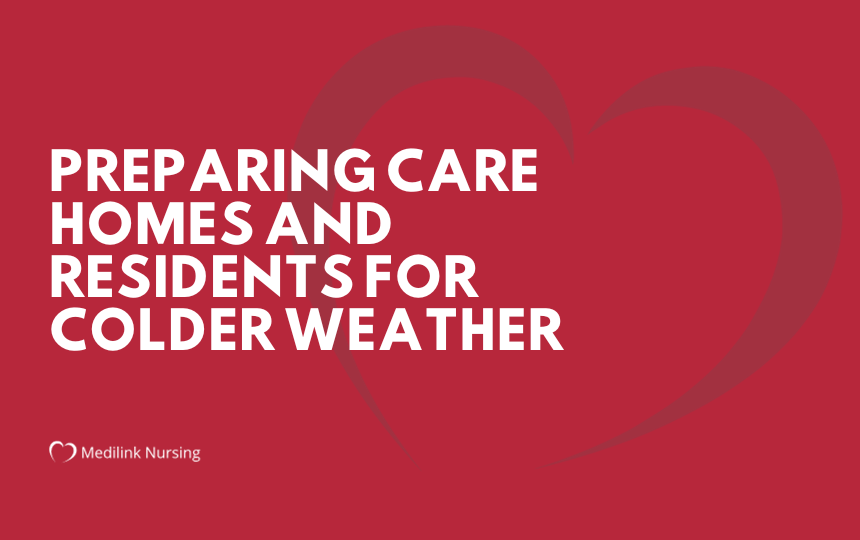As the temperature drops and winter sets in, it’s essential for care homes to take proactive steps to support their residents during this colder weather. Here at Medilink Nursing, the well-being of the people we care for is our top priority, and we want to share some crucial information on how to ensure the health and comfort of residents in care settings.
Understanding the Risks of Colder Weather
Winter can pose various health risks, especially for the vulnerable people staying in residential homes. Colder weather can exacerbate existing health conditions and increase the risk of illnesses such as flu and pneumonia.
Additionally, reduced daylight hours can impact mood and overall well-being.
Both the UK government and NICE have provided comprehensive guidelines to help support vulnerable people before and during the colder weather. These guidelines emphasise the following key points:
- Identifying Vulnerable Residents: It’s important to identify residents who may be more susceptible to the effects of cold weather, such as the elderly, those with pre-existing health conditions, and individuals with reduced mobility.
- Ensuring Adequate Heating: Care homes should maintain a comfortable indoor temperature, typically around 18°C, and ensure heating systems are in good working order.
- Promoting Hydration: Encourage residents to stay well-hydrated, as the dry air in heated rooms can lead to dehydration. Provide warm drinks and monitor water intake.
- Preparing for Emergencies: Develop a cold weather plan, including protocols for residents and staff safety during extreme weather events, such as snowstorms or power outages.
- Adequate Clothing: Ensure residents have warm clothing, including hats, gloves, scarves, and extra blankets for their beds.
- Flu Vaccination: Encourage residents to get their annual flu vaccination to reduce the risk of influenza during the winter months.
- Mental Health Support: Be attentive to residents’ emotional well-being during the winter. Reduced daylight can contribute to feelings of depression, so provide opportunities for social interaction and activities that boost mood.
- Communication: Keep residents and their families informed about the care home’s cold weather plan and any changes in routines.
- Staff Training: Ensure that all staff members are trained to recognize the signs of cold-related illnesses and can respond appropriately.
- Medication Management: Pay special attention to medication management during colder weather, as certain medications may need to be adjusted to account for temperature changes.
- Monitoring Health: Regularly monitor the health of residents, particularly those at higher risk. If any health concerns arise, address them promptly.
To read more about the guidelines shared by the government and NICE, you can access the information here:

Keep Warm, Keep Well
In addition to the guidelines as set out above, the UK government’s “Keep Warm, Keep Well” leaflet offers some valuable tips to help residents stay warm and healthy during the winter:
Eat Well: Try to make sure that residents consume hot meals and drinks regularly to keep energy levels up.
Stay Active: Keeping residents moving as much as possible to generate body heat. Gentle exercises can help.
Layer Clothing: Ensure residents are in layers to trap warm air close to their body.
Seal Gaps: Block drafts by using draft excluders and sealing gaps in windows and doors if needed.
Use Heated Blankets: Electric blankets can provide extra warmth when needed. By following these guidelines and staying vigilant, we can all do our part to provide the best possible care for residents during colder weather. Our staff are committed to ensuring the health and comfort of residents, and will continue to implement the necessary measures to keep everyone safe and well throughout the winter months.

Conclusion: Preparing Care Homes and Residents for Colder Weather
Caring for vulnerable residents during cold weather is a top priority for care homes. By following the UK government’s and NICE guidelines and incorporating these additional tips, we can all play our part to ensure that residents remain safe, comfortable, and healthy throughout winter.
At Medilink Nursing, we are dedicated to providing the highest standard of care to our residents. Together, we can make winter a warm and safe season for everyone in our care. To find out more about what we do, or to book staff, please do not hesitate to get in touch via the buttons below or email care@medilinknursing.com or call 0113 877 6383 to speak to someone today.
Further Reading:
If you found our page useful, you might enjoy reading our posts on:
What’s the difference between a Care Home and a Nursing Home?
Agency Staff V Permanent Staff
Vascular Dementia – Michelle’s Journey

